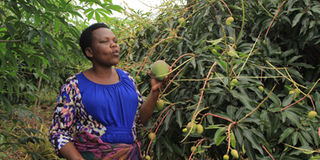Kyinkuhaire picks her money from mangoes

Annet Kyinkuhaire displays mango fruits at her farm in Mooya village, Kitura Sub-county. Photo by Rachel Mabala
What you need to know:
Annet Kyinkuhaire bought 550 mango seedlings at Shs4,000 each. She bought Tommy Red mango variety. She preferred this variety because of its long shelf life, writes Fred Muzaale.
On the gentle hill in Mooya Village, Kitura Sub-county in Kiruhura District is an expansive mango plantation.
On the farm, a middle-aged woman harvests ripe mangoes, and puts them in a basket. The big mangoes weigh about one kilogramme each.
The two and a half acre mango farm belongs to Annet Kyinkuhaire, who is a commercial fruit farmer. She also grows oranges.
The start
Kyinkuhaire says she was previously a subsistence farmer growing mainly maize, beans and other food crops.
“By mere chance, I would occasionally get surplus after harvesting the food,” she recollects, adding “I would earn little money from selling my produce, which money would not satisfy my needs.”
The 47-year-old, mother of four, however, says 2014 was her turning point. She says that year, while attending President Museveni’s rally in Bushenyi Town, he appealed to them to engage in commercial farming.
“During his speech, the President advised us to utilise our land properly by dividing it into pieces to accommodate citrus fruits, food crops and under zero grazing. I took the advise and when I went back home, I decided to give it a try,” she says.
A month later, Kyinkuhaire was invited for a workshop organised by The Hunger Project to study the agronomy of mixed farming in Mbale District. In the training she was taught to grow perennial crops for sustainable income and also how to look after a dairy cow. “After the workshop I was among the best students. I returned home to practice what I had learnt,” she says. After the training, she bought 550 mango seedlings at Shs4,000 each. She bought Tommy Red mango variety. She preferred this variety because of its long shelf life and tolerance of handling and transportation with little or no bruising degradation.
She planted 500 mango trees on a two and a half acre -piece of land.
Growing mangoes was her choice as they can act as an insurance when she gets old.
The Hunger Project
The Hunger Project (THP) is a global, non-profit, strategic organisation committed to the sustainable end of world hunger. In Kiruhura District, it operates in the Sub-counties of Kashongi, Kitura, and Kanoni. With support from Agricultural Business Initiative (aBi), THP has supported nine Saccos in Kiruhura District.
Care of mangoes
Kyinkuhaire says she ensures that the mango plantation is weed-free. Whenever they flower, she sprays them with pesticides to kill pests such as mango hoppers and others insects harmful to the fruits.
Market
Since 2017, Kyinkuhaire has harvested five times. She harvests mangoes twice a year in June and December. She sells each mango, at a farm gate price of Shs1,000. Most of the buyers are from Kampala although she also supplies supermarkets in Mbarara and other towns.
Each season, she earns about Shs3.5m from selling mangoes.
Achievements
The mother of four earns enough revenue from the investment to meet the basic needs of her family and pay her children’s school fees.
She adds that the training by THP have helped her to gain a lot of knowledge on farming and also changed her mindset.




